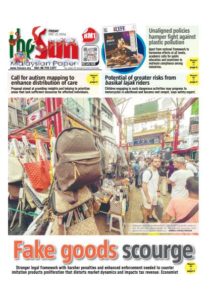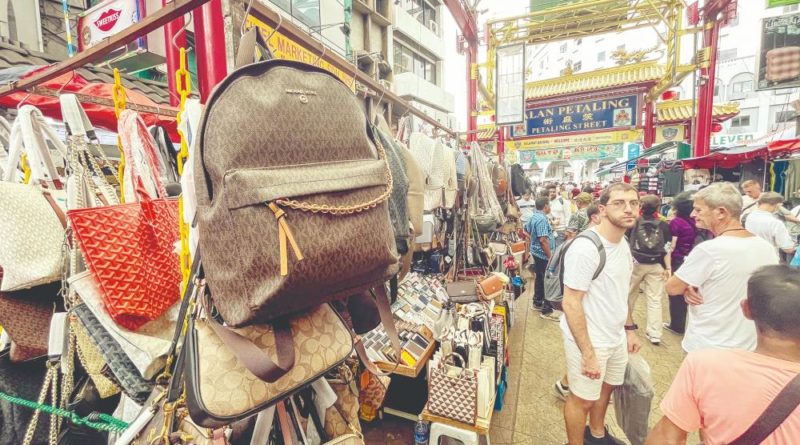ASEANEWS HEADLINE-BIZ | KUALA LUMPUR: Growing market for fake products concerning’
.
Demand undermines legitimate businesses, causing decline in economic activity and tax revenue: Expert
.
.

PETALING JAYA: Malaysia’s growing prominence as a centre for counterfeit products presents far-reaching consequences for the national economy, local businesses and consumer behaviour, said economist and Global Labour Organisation lead for Southeast Asia Prof Niaz Asadullah.
“The International Chamber of Commerce put global counterfeiting and piracy losses at over US$2.3 trillion (RM10.29 trillion) annually. Malaysia’s strategic trade position in Southeast Asia makes the country highly vulnerable as well, and even a slight fall in GDP due to counterfeiting could cost billions in revenue and taxes.”
On Jan 8, the Domestic Trade and Cost of Living Ministry embarked on a crackdown on the counterfeit goods market, which is said to be worth some RM300 billion per annu
.
Its enforcement division director-general Datuk Azman Adam said between January and November 2023, RM14.9 million worth of counterfeit goods were seized from hotspots in Jalan Petaling, Jalan Chow Kit and Jalan Kenanga in Kuala Lumpur.
The ministry’s Johor director Lilis Saslinda Pornomo said it disposed over RM2.1 million in counterfeit goods as of Dec 16, involving 152 cases.
“We also handled 1,287 cases of illicit distribution and sales, with seizures totalling RM29.7 million and fines amounting to RM1.33 million.
“Between January and December, 66 cases involving Malaysian suspects and two involving foreigners were linked to counterfeit goods under the Trademarks Act. The cases saw the seizures of products worth RM320,435.60.”
Niaz said counterfeit luxury items have become increasingly popular among younger tourists, such as Gen Z travellers from South Korea who are drawn to them and genuine secondhand products.
“The convenience of online marketplaces has fuelled this demand. The growing market undermines legitimate businesses, causing significant declines in economic activity and tax revenue.”
SMEs in Malaysia bear the brunt of the issue since counterfeit goods divert sales from genuine products that are more expensive to produce due to regulatory compliance and quality standards.
A check by theSun showed online live sales on platforms such as Shopee and TikTok often feature luxury handbags marketed as “exact copy ori”, complete with serial numbers and authentic-looking designs that are sold at between RM200 and RM400 or more, with sellers claiming the products “might be genuine”, leaving buyers to rely on luck for authenticity.
Niaz said over time, the presence of counterfeit products would discourage businesses from investing in research and development, stifling innovation and the introduction of better products.
He stressed that beyond financial losses, the proliferation of counterfeit pharmaceuticals and personal care items poses serious public health risks, amplifying the social costs of counterfeiting.
“Poor awareness on the dangers of counterfeit food or medicines worsens the problem,” he said, adding that counterfeit goods distort market dynamics by undercutting legitimate product prices, creating unfair competition and disincentivising quality adherence among local businesses.
He emphasised the need for a multi-faceted strategy, and said strengthening Malaysia’s legal framework by imposing stricter penalties on counterfeiters and enhancing enforcement of intellectual property rights are crucial.
He also highlighted the importance of international collaboration, particularly with China and Hong Kong, which account for 84% of global counterfeit seizures.
“Enhanced intelligence sharing and cross-border cooperation could help dismantle counterfeit networks. Supporting Malaysian SMEs is vital as many operate semi-formally and lack the resources to protect their intellectual property.
“Providing legal assistance and resources for brand protection would empower them to address counterfeit threats.”
He said public awareness campaigns, such as the US “Truth Behind Counterfeits” initiative, could play a key role in educating consumers about the dangers of counterfeit goods and encourage ethical purchasing decisions.
“Japan’s adoption of blockchain to address counterfeiting in Asia also serves as a valuable example for Malaysia.”


 Memento Maxima Digital Marketing
Memento Maxima Digital Marketing








